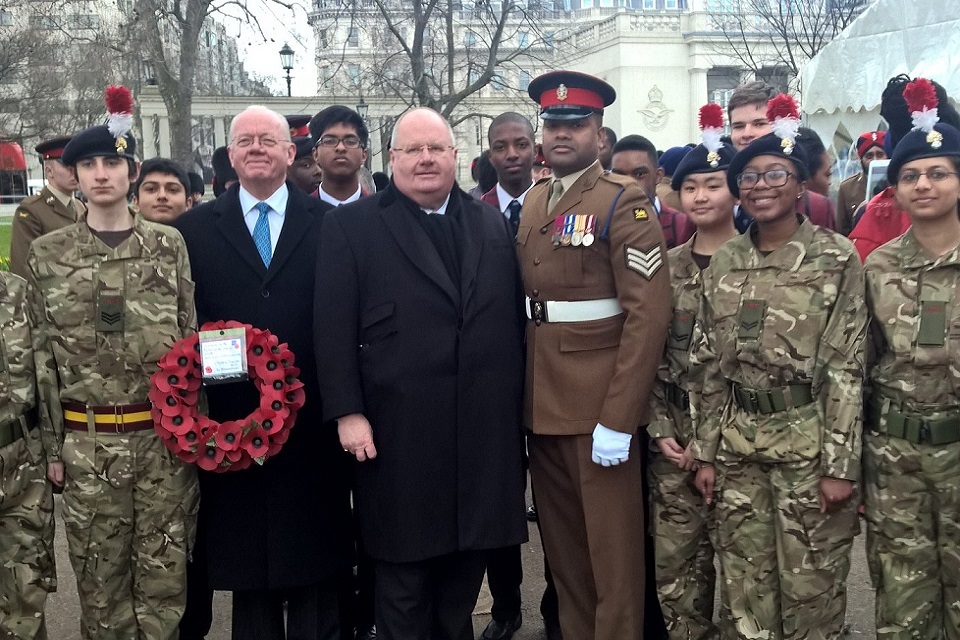The valiant troops of the world wars celebrated this Commonwealth Day
Secretary of state celebrates the contribution of Commonwealth troops in the world wars.

Thank you Baroness Flather for your introduction, and the years of service you have dedicated to this vital memorial.
The Memorial Gates offer the perfect backdrop for this occasion.
They preserve our gratitude for past sacrifices, but also represent the Commonwealth’s enduring relevance to modern Britain and all its members.
In both world wars millions of soldiers from across the Commonwealth fought side-by-side, defending the values of freedom and liberty, and defeating the dark forces of tyranny and oppression.
Every Commonwealth country shares this proud history, but we also share enduring values, which provide enormous opportunities for future cooperation.
This year significant anniversaries are directing the focus for our commemoration.
In August it will be the 70th anniversary of VJ day.
Soldiers from Australia, New Zealand, Burma and the Indian subcontinent had borne years of hardship before this final victory, enduring defeats and brutal treatment as prisoners of war.
But they never lost their resolve, and continued to push back the tide of Japanese aggression long after we were celebrating victory in Europe.
This year is also the centenary of the battle at Neuve Chappelle.
On this day 100 years ago British and Indian troops were moving into their finals positions for the assault.
The dawn offensive broke through the German defences, and shattered the illusion that Britain was content to simply hold the line.
After Neuve Chappelle everyone knew we would only be content with victory.
The battle was marked by extraordinary acts of bravery and devotion to duty.
Ten men received the Victoria Cross, including Gabbar Singh Negi from the Garhwal Rifles, who fought through the German trenches with a bayonet squad.
He was the first round each traverse, putting himself in harm’s way to protect his comrades, and eventually paying for his bravery with his life.
Last week he was one of 145 Victoria Cross recipients from the Commonwealth or born overseas that were honoured at the National Memorial Arboretum.
The new memorial mirrors our efforts to lay a paving stone for every British VC, because bravery knows no national boundary.
I attended the poignant ceremony with the Prime Minister and the representatives of 10 other countries.
Most of these brave men are remembered with great pride in their own country – roads, schools, and hospitals are named after them.
But we also want to remember them here, as a small act of gratitude for standing shoulder to shoulder with our grandparents and great grandparents.
They all fought to defend liberty and freedom, and they all helped to build the foundations for modern Britain, and the rich diversity of our society.
It’s no accident that in the post-war years the men and women who chose to make Britain their home often came from Commonwealth countries that had fought alongside us.
From East and West Africa, the Caribbean and the Indian subcontinent.
Their legacy is our legacy:
- a country which respects different faiths
- where people from all backgrounds can live together in peace
- where liberty is cherished
- where our shared values unite us, and we can tolerate each other’s differences.
But let me be clear: the legacy of the Commonwealth is not only relevant to modern Britain.
The Commonwealth also has global capabilities to advance human rights, peace and stability in a dangerous and difficult world, and become a powerhouse of prosperity.
It represents 53 countries, a third of the world’s population, and one billion people under the age of 25.
The inscriptions on the Memorial Gates bear testament to this vast potential.
One is dedicated to the memory of 5 million volunteers who fought for freedom in the great conflicts of the 20th century.
The other is from the Nigerian poet Ben Okri.
It says “Our Future is Greater than Our Past.”
That is the greatest legacy of the Commonwealth, and that is why we will continue to honour the men and women who secured this inheritance.
Thank you.

Commonwealth Day speech Eric Pickles